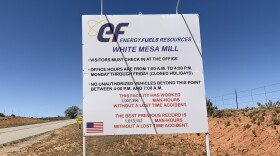-
Energy Fuels Resources says that it plans to stockpile and eventually process the uranium at its White Mesa mill facility in southeastern Utah, the last of its kind still operating in the U.S. A tribe located near the mill facility opposes the increase in uranium production due to concerns over air pollution.
-
The first conventional uranium mining done in the U.S. in eight years is underway at three mines in Utah and Arizona. Energy Fuels Resources says that it plans to stockpile and eventually process the uranium at its White Mesa mill facility in southeastern Utah, the last of its kind still operating in the U.S. Scott Clow is the environmental programs director for the Ute Mountain Ute Tribe, which is located near the White Mesa mill. Clow says he and the tribe oppose the increase in uranium production, citing the potential for a rise in air pollution for tribal residents living near the mill. He’s also concerned about the contamination of groundwater. Energy Fuels said high market prices for uranium combined with helpful government policies and the high demand for fuel for nuclear power plants also led to the decision to increase mining.
-
On Saturday, a community organization held a walk in protest of the White Mesa uranium mill on the Ute Mountain Ute reservation. It’s the only one of its kind still operating in the U.S. About 40 people attended the walk, which began in White Mesa, in southeast Utah, and ended at the driveway of the uranium mill. Manuel Heart, Chairman of the Ute Mountain Ute Tribe, led the protest and spoke to supporters about the need for more regulations from the state of Utah on how the mill uses its wells. Heart says that the Tribe ultimately hopes the state regulatory agency won’t renew the uranium mill’s application for a groundwater discharge permit later this winter. In 1999, samples were collected that indicated a plume of chloroform was present in the groundwater table underneath the mill facility on their property.
-
A community group in White Mesa, Utah, on the Ute Mountain Ute reservation, is holding its annual spiritual walk and rally on Saturday to protest the nearby uranium mill. The White Mesa uranium mill, operated by the mining company Energy Fuels Resources, is the only one of its kind still operating in the United States. The mill is part of a legacy of uranium mining in Four Corners tribal communities, many of which are still dealing with the impacts of widespread environmental contamination as the result of mining activity. Scott Clow is the environmental programs director for the Ute Mountain Ute Tribe. He says he has concerns that the state of Utah’s regulation of groundwater usage by the uranium mill has been too lax, and has led to the degradation and contamination of the Burro Canyon aquifer underneath White Mesa.
-
Earlier this month, a meeting was held in White Mesa, Utah, on the Ute Mountain Ute reservation, to remember the centennial of the town of Blanding’s attacks on the tribal community. From March 22 to April 29, 1923, Mormon settlers and townspeople from Blanding began a five-week assault that included the theft of Ute lands and children, and the murder and imprisonment of many White Mesa Utes. Regina Lopez-Whiteskunk is a former Ute Mountain Ute tribal council member and the cross-cultural programs manager for Montezuma Land Conservancy. According to Lopez-Whiteskunk, the attack on White Mesa was brought on, in part, by the Homestead Act of 1862, which allowed any American to put in a claim for up to 160 free acres of federal land.
-
The U.S. Department of Energy is building up the country's strategic uranium reserve, and that means potentially more business for regional producers of the element.
-
A new report paints a bleak picture of radioactive waste at the White Mesa Uranium Mill in Southeast Utah. And Utah Senator Mitt Romney is looking for people to join a federal wildland fire commission.
-
The Environmental Protection Agency has ruled the White Mesa uranium mill in Southeastern Utah can no longer accept radioactive waste from Superfund sites. The mill sits just a few miles away from the Ute Mountain Ute community of White Mesa. KZMU's Justin Higginbottom speaks with a lawyer who fought for this decision about the mill’s future.
-
From the 1940s to the 1980s, hundreds of uranium mills opened across the Southwestern US. Historically, the mills provided working-class jobs for the region, especially for tribal communities. But uranium and other heavy metals can be toxic, and many mill workers suffered as a result. Now, the only operating uranium mill left in the US sits just a few dozen miles from Montezuma County, in Southeast Utah. On this week's Health & Prevention Report, KSJD's Lucas Brady Woods talks to Dr. Ed Razma, pulmonologist at Southwest Health System, to get a better idea of what uranium contamination can actually do to a person's health.
-
Members of the Ute Mountain Ute Tribe and the Navajo Nation led a march on Saturday in protest against the operation of the only running uranium mill in the United States.

Play Live Radio
Next Up:
0:00
0:00
Available On Air Stations






